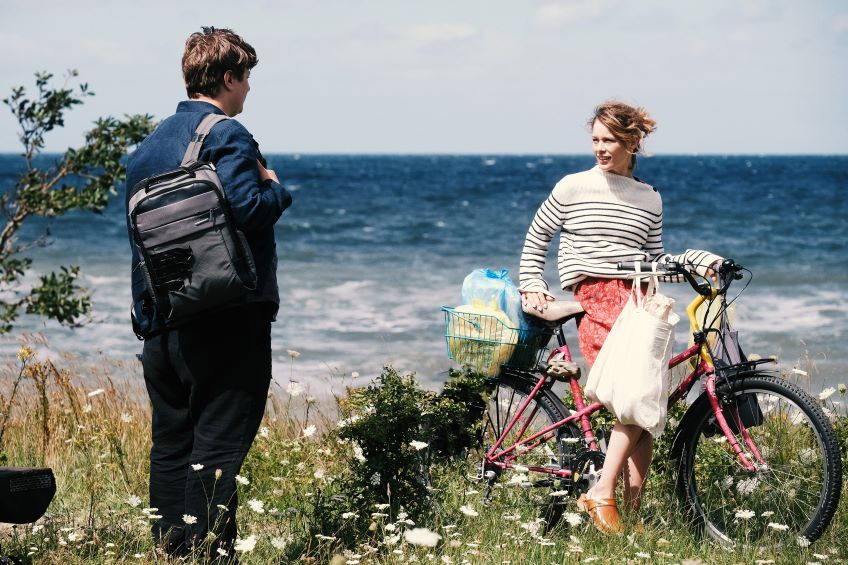Joyce Glasser reviews Afire (August 25, 2023) Cert 12A, 103 mins. In cinemas & on Curzon Home Cinema
Writer/director Christian Petzold, now 62, has always made films in German and, regardless of the international novels and films that inspire much of his work, they always lead us back to recent German history and German society today. Transit (2018), for example, is based on Anna Segher’s 1944 novel Transit Visa, but is set in a vague French police state in this century where a group of German speaking refugees and fugitives are stuck in the port of Marseille trying everything to escape.
Like most of Petzold’s films Afire is enriched with metaphor, only when he began the script, Petzold could not have foreseen just how topical his story of destructive fires on the German Riviera would become. The fires that devasted many German holiday destinations this summer sharpens the irony of writer Leon’s (Thomas Schubert) disbelief that their holiday house on the sea would be affected.
In his 2020 film Undine, based in part on Hans Christian Anderson’s The Little Mermaid, Petzold replaces his muse Nina Hoss (the star of Petzold’s Yella, Jerichow, Barbara and Phoenix) with a new muse, Paula Beer, best known here for her roles in Frantz and Never Look Away. In Undine, Beer’s eponymous character is an attractive, but lonely woman who, rather ironically, lectures on the urban development of Berlin while urgently seeking a husband, preferably a diver.

Paula Beer is the only female character in Afire and like Undine, she leads a double life, a free-spirit who sells ice-cream on the beach, a job that prejudices Leon’s views of the mysterious Russian lodger Nadja. Like Undine, there is a mythological metaphor here, but despite the significance of the beach setting, the key element is fire. The German title, Red Sky, is bettered by the English Afire which alludes to the coastal fire and the fire of love slowly burning in Leon’s barricaded heart.
‘It’s misfiring’ says lean, athletic, laid-back Felix (Langston Uibel), an art/photography student with a portfolio to produce by September. He is referring to the car that is transporting him and his smoking, heavy-set, uptight friend Leon (Schubert), to Felix’s mother’s summer house for peace and quiet.
‘I don’t hear anything’, says Leon in an opening line that says everything about his character. A published author with an urgent deadline for the manuscript of his second book, Leon is almost humorously unobservant for a writer. Just then the car breaks down and the two have to walk to the house, Leon dragging behind Felix.
Leon, who is looking forward to solitude, is irritated at signs that the two friends are not alone. Felix’s mother has let a room to a Russian student, Nadja (Beer), who “is a good cook.”

Before they even meet her, the two men, condemned to sharing a room, hear her – making love through the thin walls. Leon is now furious, both at the cramped accommodation and his interrupted sleep. They knock on the wall. Leon goes to the window and sees a figure running away.
Later, when Leon, who normally stays behind to “work”, relents and joins Felix and Nadja at the beach, he thinks he can identify the lover he saw leaving the house as the handsome local lifeguard Devid (Enno Trebs).
When Leon and Felix first meet Nadja, their complaints are tempered by their awe of this smiling, pretty, svelte young woman who offers to make dinner for them by way of apology, promising that it won’t happen again. You might struggle to believe in Najda’s character until the last quarter of the film, when she becomes more nuanced and less of a symbol or type. As they accept her apology, Leon looks at Nadja a bit too long and intently. It takes a long time for him to understand what it means.
Devid becomes a regular at the house and he helps Felix fix the mouldy roof. From the roof they see the red sky and the forest fires still a safe distance away. But they loom over the house like a dark threat to their sunny holiday. Leon remains below.
Leon discovers that Devid is not Nadja’s mystery lover and indeed, she will be ousted from her room, obliged to share with Leon, when Devid and Felix themselves become lovers. That Leon was never aware of Felix’s sexuality is typical of this character who misses so much of life by refusing to participate in it.
This comes to a head when Nadja offers to read Leon’s manuscript, Club Sandwich, and he reluctantly consents. When she offends him with her candid view, he can dismiss it with, ‘what does an ice-cream seller know?’ But when his publisher, Helmut (Matthias Brandt), arrives and confirms Leon’s worst fears, he must listen.
Craving a quiet dinner with Helmut, he is bemused when he accepts Nadja’s invitation to dinner, and the two bond over Nadja’s love of Heinrich Heine’s collection of poems, Romanzero. That Heine was dying of a long, painful illness while he was writing is not lost on Helmut, a man whose own health, as Nadja surmises, is poor. Self-absorbed Leon feels only jealousy that his time with Helmut was hijacked.
With so many of Petzold’s films being loosely adapted from novels or films, you cannot help but think of Jacques Deray’s 1970 La Piscine (The Swimming Pool), a drama of sexual jealousy on the French Riviera or of Eric Rohmer’s comic drama, Pauline at the Beach. But with the discussion of Heine in the dinner scene, thoughts drift to German novelist Thomas Mann. Not only to Death in Venice – though there is death near Petzold’s Baltic beach – but to Mann’s novella, Tonio Kröger, the writer as a self-aware observer, condemned to sit on the sidelines of life.
But he looked into himself, where there was so much grief and longing. Why, why was he here? Why was he not sitting in his room by the window, reading in Storm’s ‘Immensee’…? That would have been the place for him. Let the others dance and be lively and adept at it … But no, this was the right place after all, where he knew himself near to Inga, even though he only stood lonely and far off, trying to distinguish her voice, with its ring of warm life, in the hum, clinking, and laughter there within.’




